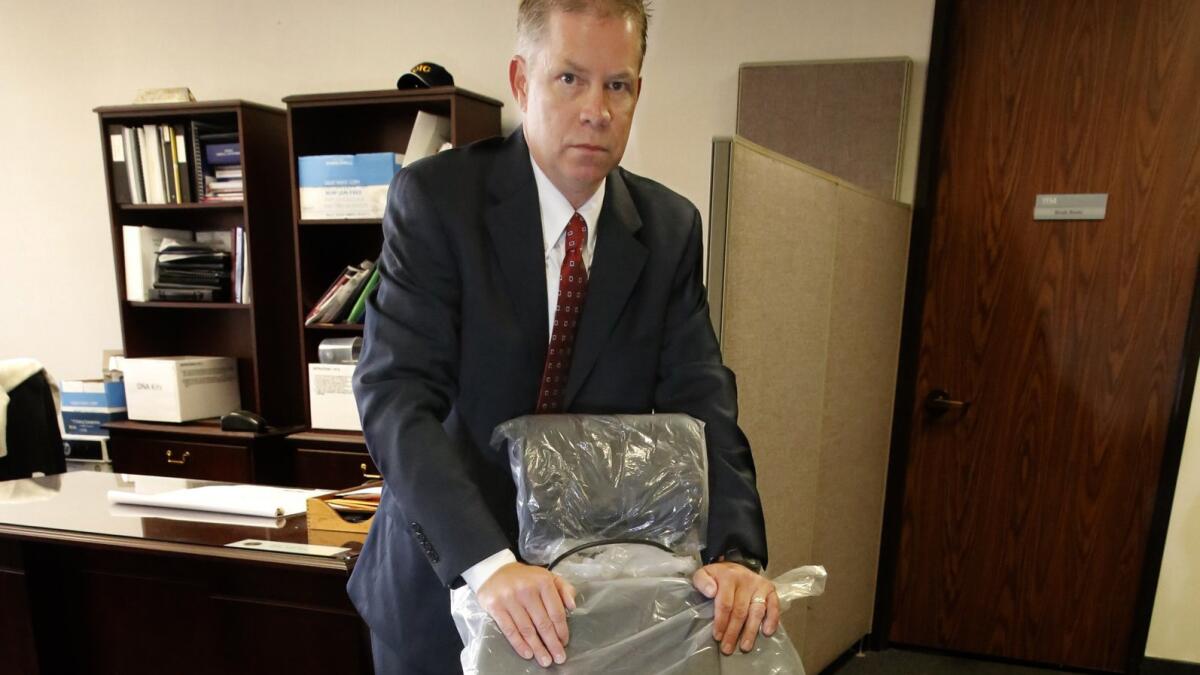On the record: Special agent Glenn Ferry fights Medicare fraud

Glenn Ferry says one Medicare scam involves motorized wheelchairs for patients who don’t need them.
- Share via
Glenn Ferry has busted pastors, organized crime figures and fake nurses in nearly three decades fighting Medicare fraud.
He’s special agent in charge of the Los Angeles regional office of the U.S. Department of Health and Human Services’ inspector general. His territory spans Southern California, Nevada, Arizona and Hawaii.
To better combat fraud nationally, the Obama administration has boosted investigations in “hot spots” such as L.A. and Miami and adopted more sophisticated technology.
Last month, in one of Ferry’s cases, a federal judge sentenced the former owner of a Valencia medical supply company to eight years in prison for submitting $3.5 million in fraudulent claims to Medicare and California’s Medicaid program.
Despite more arrests and financial recoveries nationwide, critics say Medicare still doesn’t do enough to crack down on fraud and other improper payments that cost taxpayers an estimated $60 billion annually.
Ferry, 50, sat down recently with The Times to discuss federal efforts to stem the losses in government health programs.
Is the government making headway in this billion-dollar battle?
I can see improvements. It is frustrating we can’t get all the fraud and crooks. The complexity of these cases has grown over the years. That makes it even more challenging for us.
For every dollar put into fighting healthcare fraud by us and our partners, we get $7 back into the Medicare trust fund. That is a stock I would invest in. If I could get 10 more agents, imagine the return on that.
We have more cases than we can handle, so we have to pick those that have the most impact. Our trials have significantly increased. We have a lot of resources going into that because we want to make sure our cases are slammed shut.
How is technology changing how Medicare fights fraud?
We now have direct access to Medicare data, and that makes life a lot easier to identify potential cases. For years we had to request Medicare data from outside contractors. That could take months, slow down an investigation and cause more money to go out the door.
Now agents sitting at a computer can do data mining and identify billing abnormalities. It doesn’t mean it’s fraud, but it gives us a head start to look more closely and drill down.
We also have agents dedicated not just to putting criminals in jail but these agents want to make changes to the system. They see how these criminals are beating the system. It’s refreshing to see they can make recommendations now on how to close those loopholes.
How prominent is organized crime in healthcare fraud?
We had an organized crime ring operating out of Glendale, and six individuals were convicted in 2009. That gave us true insight into dealing with these individuals who were turning to Medicare fraud as a source of revenue.
We continue to be proactive in looking at organized crime’s involvement in Southern California. They see dollar signs, and in some cases this is safer for them than dealing drugs or weapons.
We had an ambulance fraud case, and when we served search warrants we found our press releases and articles. They are educated about what’s going on.
What role do doctors play in these schemes?
The majority of physicians are legitimate and just want to take care of patients. But the impact made by a small percentage is scary and frustrating.
Criminals will advertise in the newspaper seeking a physician to work at a clinic. They reel them in and sometimes the doctor catches on and leaves. But the criminal still has their identity. A lot of these doctors are too embarrassed to contact Medicare about what happened. But there are millions of dollars going out under their name.
What newer problems keep you up at night?
Drug diversion in Medicare’s Part D prescription-drug program is just skyrocketing. It could be a financial tsunami. There are doctors selling their prescriptions. There are patients who doctor-shop and look for pain medications to sell themselves. Pharmacists conspire with medical clinics and doctors to transport patients to the pharmacy to get drugs they don’t need.
And it’s not always schedule 2 [narcotics] like OxyContin. It can be other very expensive drugs like Abilify [an anti-psychotic medication] or the new hepatitis C drugs that cost so much. Greed makes people do interesting things.
What should consumers do if they suspect impropriety?
They can contact the office of inspector general hotline at (800) HHS-TIPS or visit https://forms.oig.hhs.gov/hotlineoperations. A number of our successful investigations were initiated by a complaint our office received from the hotline.
What’s next for you?
I’m retiring at the end of this month after 27 years with the agency. I will still be involved in fighting healthcare fraud working at a Medicare billing contractor, SafeGuard Services. I’ll just be doing it without the gun and badge.
Twitter: @chadterhune
More to Read
Inside the business of entertainment
The Wide Shot brings you news, analysis and insights on everything from streaming wars to production — and what it all means for the future.
You may occasionally receive promotional content from the Los Angeles Times.










